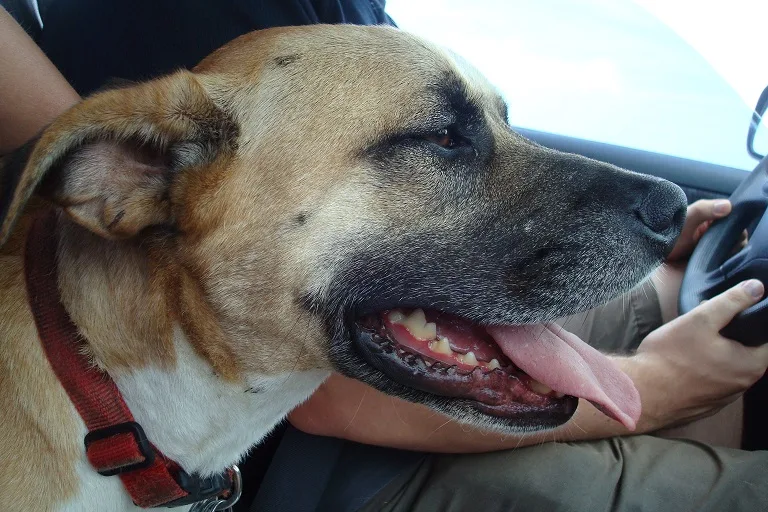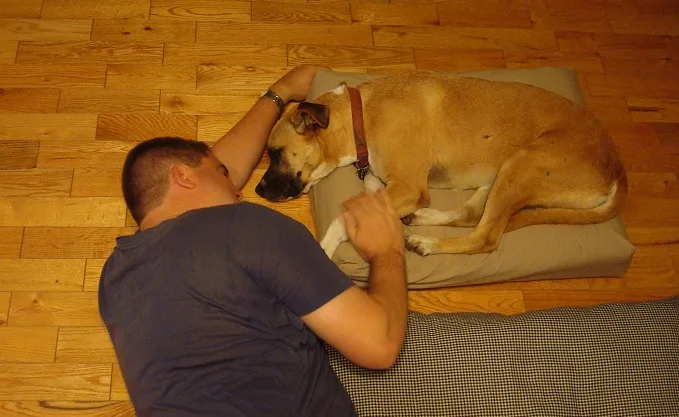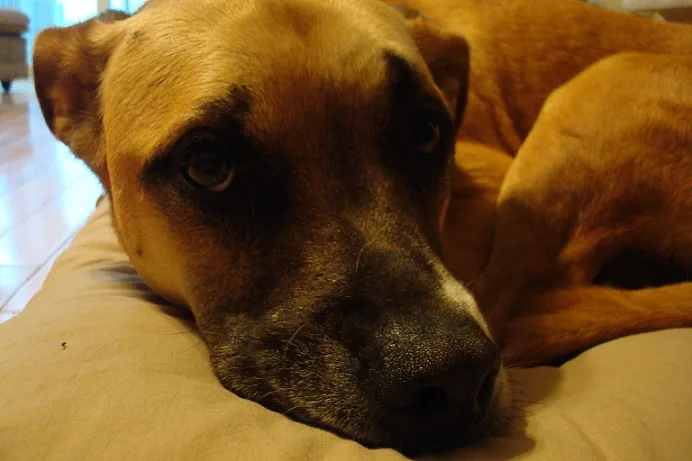As I posted a little while ago, the beginning of the summer marked four years with our dude Baxter.
As I was reflecting back, I started thinking about his adoption and our experience with the rescue group that found Bax. There were some things that I think they handled really, really well (especially after I’ve heard about other people’s experiences with rescue), and there’s one thing that is still a huge question mark for me.
What the rescue organization did well
They posted Baxter on Petfinder. Petfinder was my go-to when we were looking for a dog. There is no way I would have found Bax if I’d had to search individual rescue or shelter sites.
They had a detailed questionnaire. This helped them understand us and our approach to dog ownership. The questionnaire also forced me to think about the details of having a dog—I had to supply my vet’s name and contact information, ditto for a trainer. I had to talk about the food we were planning to feed. For someone who hadn’t had a dog before, this level of detail wasn’t immediately in my brain, so it got me thinking.
Baxter on the day we drove him home:

They followed up on the questionnaire. The questionnaire asked about other animals, so I included our barn cat Ralph. The rescue called our vet to ask about her and what care and treatment she’d received. Being a barn cat, she hasn’t had a whole lot of treatment, but the rescue group was flexible and accommodating in this area and recognized that there are reasons we don’t bring our barn cat to the vet for annual check ups.
They did a home visit. Yes, home visits can be annoying and over the top. However, I think they show a level of diligence that is important. I could have put whatever I wanted on the questionnaire or been untruthful in my phone interview. A home visit does a better job of showing how the dog will be living and what kind of family he’ll be joining.
They were flexible. This is the biggest one for me—especially given what I’ve heard about some rescues. I already mentioned Ralph, which maybe could have been an issue. We also don’t have a fenced yard area on the farm. We definitely talked about that with the rescue, but it wasn’t a deal breaker for them.
See That Mutt’s post: Why most dogs don’t need a fenced yard.
The deal breaker for the rescue
We had planned to use an outdoor run for Baxter when we weren’t home. This ended up being a deal breaker for the rescue—they were concerned that he would be too cold in the winter, and rejected our application.
I called and appealed and pledged to never use the outdoor run in cold weather. They were flexible enough to reconsider—and believe I was being honest—and we were able to adopt Bax.
See my post: Outdoor dog run fail.
The question mark
The actual adoption is my biggest question mark with Bax. We went to where he was fostered and met him for the first time. He ambled over and met us. We scratched his head. We talked to his foster mother a bit and asked a few questions. Then she handed us his leash, we put him in our car and headed home.
We had a dog.
In hindsight, I feel like there should have been a few more meetings—more get-to-know-yous, or at least a walk to get a little bit acquainted.
At the same time, I’m not sure it’s possible to get to know each other just through a walk or a couple of hours. It took time for Bax to relax and be himself. And I feel like we needed the environment and routine of home and the farm and our new little family together to sort that out.
Baxter and Matt getting acquainted:

If things hadn’t worked out, we could have followed up with the rescue group and worked through things with them—if worse came to worse we would have even returned Baxter to them.
And in the end, everything did work out wonderfully for us, and we ended up with our perfect dog. And I’m very grateful to our rescue for the best thing they ever did—picking Baxter out of his shelter so that he could become ours.
What were some of the things you liked or didn’t like about where you got your dog?
How did the process go for you, whether you went to a shelter, breeder or elsewhere? Let us know in the comments.
Julia Thomson is a blogger at Home on 129 Acres where she writes about her adventures of country living and DIY renovating. She and her husband live on a 129-acre farm in Ontario, Canada.
Baxter’s first day home:

Related posts:
When a dog rescue volunteer buys a puppy
Returning a rescue dog due to separation anxiety
How to get your dog adoption application approved
What good rescues and good breeders have in common

Lindsay Stordahl
Monday 28th of August 2017
I've never adopted a dog or cat through a rescue but I've volunteered with a couple of rescue groups as a foster home so I've been directly involved with several adoptions. In most of these cases, the adoption took place on the 2nd or 3rd meeting so I can see Julia's point on taking more time to get to know the dog first. But that's not always possible. One of my foster dogs did get adopted the first time her new family met her, but we spent about an hour talking and walking and they got to know her pretty well in that time. This particular group does not normally do home visits so the family was able to adopt her right at the adoption event that day.
I got my first dog Ace directly from his previous owner. This was very beneficial because she was able to tell me so much about him and did so honestly. I was trying to adopt through a shelter or rescue at that time, but they would not respond to my applications. In this case, it worked out for the best.
With my newest dog Remy, our experience with a breeder was very positive. She had a detailed questionnaire and was concerned about me living in an apartment. However, she was willing to work with me and compromise after I explained I am a serious, long-distance runner and will be active with the dog. I could not get past the application process with any of the breed-specific rescues I applied with because I live in an apartment and also didn't have my senior, indoor cats vaccinated.
All in all, I think good communication is the main thing no matter where you get the pet from. I did many of the "home visits" for one of the rescues I volunteered for and they told me to reject one potential adopter because they had an outdoor dog run, like Julia's. Thankfully, the rescue reconsidered and I'm glad they did because that dog has the best home and they don't even use the dog run either! :) The dog would rather be left in the house, just as Baxter prefers. Silly dogs.
KL
Wednesday 30th of August 2017
Lindsay, I do home visits as well, and I do vet and reference screenings. It's actually a lot of fun, and I look at my job as that of data collector. It would be really easy to start thinking of myself as a gatekeeper, and I try NOT to do that. I remember what it was like submitting the initial application to my breeder and just KNOWING this was what I wanted. I was new to the breed and new to dogs and was so nervous that I wouldn't measure up.
That's always in the back of my mind when I'm evaluating a rescue applicant. I look for any way I can to help get someone approved, within reason. I won't compromise standing policies or the well being of the dogs, but I will work with someone to help them track down required veterinary documentation and ask questions if I need help interpreting the policy and think there might be a nuance we should talk about before denying the applicant. Perfect is the enemy of good, and we should value good applicants. If we don't have a dog in the near term that would be a good match for them, they might choose to go elsewhere...or they might not. They might choose to wait and adopt from us, or they might choose to foster for us while they wait, and that's a win for the dogs in our care. I started doing this because I wanted to work with that specific organization (it's a really good one), but it turns out I really love what I do, which is a bonus.
Julia at Home on 129 Acres
Monday 28th of August 2017
I'm looking for exactly what you experienced from your breeder and the advocacy you did with your rescue--consideration and thought. Not just blanket policies. I appreciate the opportunity to talk things through, explain my perspective and understand theirs. One size fits all is not always the answer.
KL
Monday 28th of August 2017
I got so lucky with my breeder. When I'm being truly honest, I cannot think of anything that I'd have asked her to change. I wrote a piece a year or so ago for Lindsay's blog about good breeders and rescues, and my breeder was my inspiration for the breeder side. But here are some things she did.
1. There was an application. She asked a small but targeted set of open ended questions that allowed people to share who they were and why they wanted a dog, but that also allowed them "tells." When I went back and looked at the questions again after answering them, I realized that what people didn't say in response to the questions was probably as important as what they did.
2. She required a meeting. Ideally, she would get to meet with you in the early stages. She was willing to share as much info about the breed as you could want. To her, showing was important along with telling; she wanted to welcome approved puppy applicants to meet her and her dogs and see who they were.
3. She has a carefully thought out contract that protects all parties involved, including the dog. She will take the time to go over it with you and make sure you understand what's in it and why it's there.
4. She is always available for support. There's a closed Facebook group for those of us who bought puppies from her. We can post photos and stories and brags, and we can ask any questions and get insights from her, from other breeders who are in the group, and from owners of our puppies' siblings or even parents in some cases. It's like an extended family in some ways.
5. She will help you with training/vet/dog sport resources. She has a lot of local suggestions to offer. And she'll crowdsource resources in other locations for buyers who are far away.
6. She will mentor you if you want to do a little more. She has buyers who have show quality puppies, and she's enthusiastic about helping them get started. She prefers a particular dog sport, and she does her best to help interested puppy buyers involved in at least trying it if they want to.
7. She works with other breeders. My dog is actually not one of hers; she was bred by someone else, and the breeders cooperate on placing puppies when the best match for someone on a wait list might be the other person's litter. I couldn't have asked for a better fit if I'd ordered my dog from a menu. She's exactly what we wanted and exactly what they predicted she'd be.
This is all on top of the health testing, showing, and titling this breeder does with her breeding stock. I got so, so lucky finding her and her dogs.
Lindsay Stordahl
Monday 28th of August 2017
Here's a link to KL's essay: https://www.thatmutt.com/2016/05/01/good-breeders-and-good-rescues/
Julia at Home on 129 Acres
Monday 28th of August 2017
That sounds like a very positive thoughtful experience. I think thoughtfulness is important. Your breeder obviously has thought about what's best for her, her dogs and her owners. And her process gets you thinking as well. Thanks for sharing your experience.